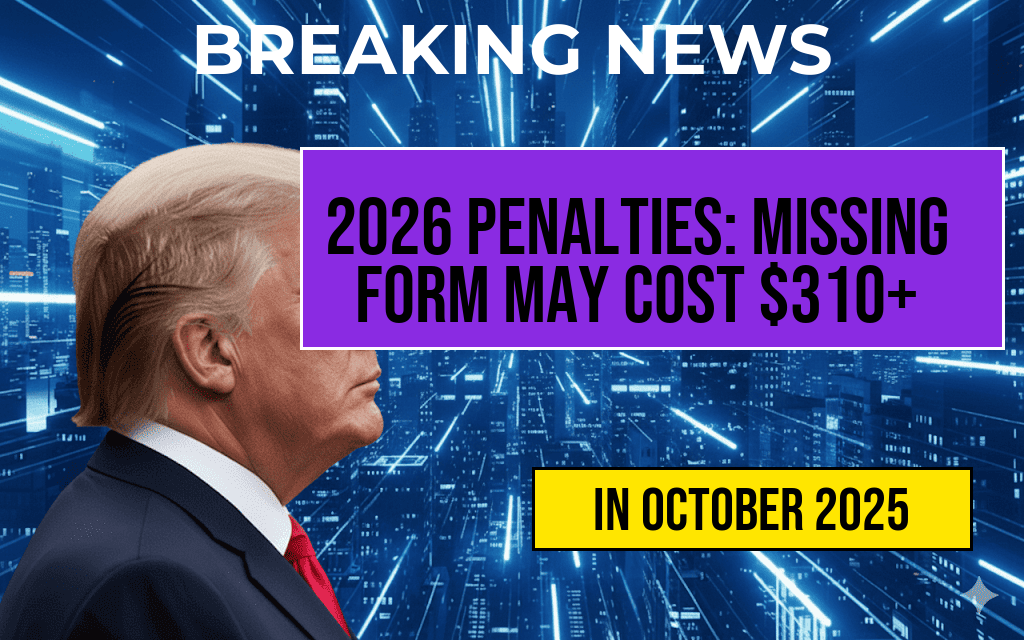As taxpayers prepare for the 2026 tax season, many may be unaware that projected late-filing penalties could significantly raise their tax bills. The Internal Revenue Service (IRS) has outlined potential increases in penalties for those who file their returns after the deadline. Tax experts warn that these changes may lead to additional charges amounting to hundreds of dollars for individuals who fail to file on time. With the IRS continuing to tighten enforcement measures, understanding these penalties is crucial for effective tax planning.
Understanding Late-Filing Penalties
The IRS imposes late-filing penalties to encourage timely submission of tax returns. These penalties can accumulate quickly, impacting taxpayers’ financial situations. For 2026, the IRS has proposed an increase in the penalty rate, which is designed to adjust for inflation and ensure compliance.
Current Penalty Structure
| Filing Status | Penalty Rate | Maximum Penalty |
|---|---|---|
| Individual | 5% per month | 25% of total tax due |
| Corporation | 5% per month | $205 per month |
Currently, the penalty for failing to file a return on time is set at 5% per month of the unpaid tax, with a cap at 25%. For corporations, the penalty is limited to a maximum of $205 per month. However, these figures are projected to rise, potentially doubling the impact on taxpayers.
Projected Changes for 2026
As tax legislation evolves, the IRS has indicated that the late-filing penalty rates may increase. This adjustment is part of a broader effort to ensure compliance and address the growing tax gap. Experts anticipate the new penalties could reach up to 10% per month for individuals, resulting in a maximum penalty of 50% on unpaid taxes.
How Much Could You Pay?
To illustrate the potential impact, consider a scenario where a taxpayer owes $5,000 in taxes but files their return three months late:
| Months Late | Penalty Rate | Total Penalty |
|---|---|---|
| 1 | 10% | $500 |
| 2 | 20% | $1,000 |
| 3 | 30% | $1,500 |
In this example, filing three months late could result in a penalty of $1,500—a significant increase compared to current rates. Such penalties could create financial strain for taxpayers, especially those already facing economic hardships.
Tips to Avoid Late-Filing Penalties
To mitigate the risk of incurring late-filing penalties, taxpayers are encouraged to take proactive steps:
- Plan Ahead: Begin organizing tax documents early and establishing a timeline for filing.
- Use E-Filing: Consider electronic filing, which can streamline the process and ensure timely submission.
- Seek Professional Help: Consult a tax professional for assistance in navigating tax laws and deadlines.
Taxpayers should also stay informed about legislative changes that may impact their filing requirements. Resources such as the IRS website and reputable financial news outlets can provide valuable insights into evolving tax laws.
Final Thoughts
The anticipated increase in late-filing penalties for 2026 could have significant financial implications for many taxpayers. By understanding the risks and taking appropriate measures, individuals can better prepare for the upcoming tax season and avoid unnecessary penalties. For more information on tax penalties and regulations, refer to the Forbes article detailing current IRS guidelines.
Frequently Asked Questions
What are the projected late-filing penalties for 2026?
The projected late-filing penalties for 2026 are expected to increase significantly, which could result in taxpayers facing additional fees that add hundreds of dollars to their tax bills.
How can late-filing penalties affect my overall tax liability?
Late-filing penalties can substantially raise your overall tax liability by adding extra costs on top of the taxes owed, making it crucial to file your return on time.
What steps can I take to avoid late-filing penalties?
To avoid late-filing penalties, ensure you file your tax return by the deadline, consider requesting an extension if necessary, and keep accurate records of your income and deductions.
Will the penalties be the same for everyone?
No, the late-filing penalties can vary based on individual circumstances, including the amount of tax owed and how late the return is filed, leading to different impacts on tax bills.
Where can I find more information about tax penalties and filing deadlines?
For more information about tax penalties and filing deadlines, visit the IRS website or consult a tax professional to stay updated on any changes that may affect your tax situation.








